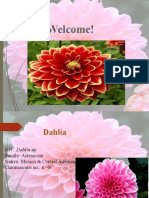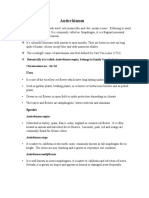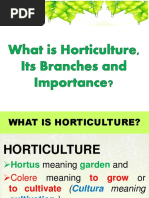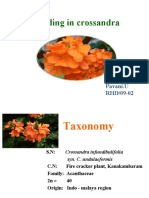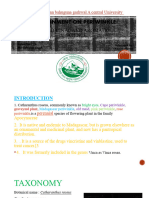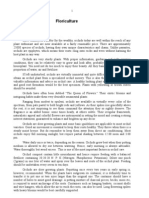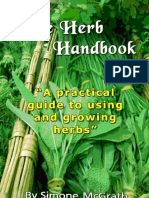0 ratings0% found this document useful (0 votes)
1 viewsCarnation
Carnation
Uploaded by
Diana RoxanaCopyright:
© All Rights Reserved
Available Formats
Download as PPTX, PDF, TXT or read online from Scribd
Carnation
Carnation
Uploaded by
Diana Roxana0 ratings0% found this document useful (0 votes)
1 views12 pagesCopyright
© © All Rights Reserved
Available Formats
PPTX, PDF, TXT or read online from Scribd
Share this document
Did you find this document useful?
Is this content inappropriate?
Copyright:
© All Rights Reserved
Available Formats
Download as PPTX, PDF, TXT or read online from Scribd
Download as pptx, pdf, or txt
0 ratings0% found this document useful (0 votes)
1 views12 pagesCarnation
Carnation
Uploaded by
Diana RoxanaCopyright:
© All Rights Reserved
Available Formats
Download as PPTX, PDF, TXT or read online from Scribd
Download as pptx, pdf, or txt
You are on page 1of 12
Carnation
The fairest flowers o’ the season
Are our carnations and streaked
gillyvors,
Which some call nature’s bastards.
– William Shakespeare
General information
• Carnation, (Dianthus caryophyllus), also called
grenadine or clove pink, herbaceous plant of the
pink, or carnation, family (Caryophyllaceae),
native to the Mediterranean area. It is widely
cultivated for its fringe-petaled flowers, which
often have a spicy fragrance, and is used
extensively in the floral industry.
Flower anatomy
• calyx – the outer whorl of sepals that
are typically green, but are petal-like in
some species.
• corolla – the whorl of petals which are
usually thin, soft, and colored to attract
pollinating insects.
• androecium - the stamen that is made
up of a filament topped by an anther
where pollen containing the male
gametes is produced.
• gynoecium - the carpel that contains
the female reproductive organs and
contain an ovary with ovules, the
female gametes.
Spray carnation - Spray
carnation is generally a bunch of
flowers on short branches of a
Standard carnationsingle stalk. The flowers are
small and compact
- These have single Micro carnation - These have
large flower on anon each branch.shorter stems and higher
individual stem production than spray varieties.
used as cut flower. These are used as ornamental
pot plants besides its utility in
flower arrangement.
Carnation
varieties
Use of
carnation
• Carnations are used in tea
to relieve stress, fatigue,
depression, insomnia and
female hormonal
imbalances. They are also
used in massage oils
to treat skin irritations or
reduce the appearance of
wrinkles. The
ancient Aztec Indians
used carnation tea as a
diuretic and to treat chest
congestion. The primary
use of carnations in the
United States is as a cut
flower or in cosmetics.
Meaning
• The carnation’s scientific
name, Dianthus, comes from a
combination of two Latin words:
“dios,” meaning gods,
and “anthos,” meaning
flower. Carnations are referred to as
the flowers of the gods
• The carnation flower’s message is as
individual as the recipient is. While they
all symbolize love, distinction and
fascination, you can tailor your message
by the color you choose.
Language of flowers
Carnation What they mean
• Carnations in general Fascination, Woman's Love
• Pink Carnations Mother's love
• Light red Carnations Admiration
Deep love and a woman's affection
• Dark red Carnations
Pure Love and Good Luck
• White Carnations
Regret, Refusal
• Striped Carnations
St. Patrick's Day
• Green Carnations Capriciousness
• Purple Carnations Dissapontment, Dejection
• Yellow Carnation
History
• The green carnation became a queer symbol
in 1892 when Oscar Wilde instructed a
handful of his friends to wear them on their
lapels to the opening night of his
comedy Lady Windermere’s Fan. From then
on, wearing a green carnation on your lapel
was a secret, subtle hint that you were a
man who loved other men.
Harvesting carnation
• After planting normally carnation takes
110-120 days to come to peak flowering. A
commercial carnation plant is capable of
producing 8 to 20 flowers per year.
• Depending upon market demand
harvesting can be delayed by covering the
buds with bud nets. When the buds start
showing colour, bud nets can be put
covering the entire flower bud, this also
enhances the bud size besides regulating
the flower development.
Post harvest
operations
• Immediately after harvest, cut ends of the carnation flower
stems should be placed in a bucket containing clean water or
floral preservative of biocide and acidifying agent.
• These flowers are pre cooled as early as possible at 20C for two
to four hours
• Only healthy and uniform cut flowers are graded based on stem
length and bud size.
• As per the market requirement, bunch of 10, 15 or 20 flowers
are tied with rubber band and the blooms covered with butter
paper sleeves.
• Leaves on 1/3rd of the basal stem are removed and end of the
stems trimmed.
• These bunched and trimmed flowers are immediately placed in
a bucket of preservative solution prepared in de-ionized water
again.
• A good preservative solution for carnations should be acidic (pH
4.5) with 2-5% sucrose and a biocide for pulsing .
Dryin carnation
• There are two main ways to
preserve carnations. The air-drying
method can be used to dry
Click toseveral
add text
flowers at once, but the blooms will
be discolored. Drying carnations in
the microwave generally preserves
their color and shape, but the
flowers must be dried one at a time.
Bibliography
• http://www.microscopy-uk.org.uk/
mag/artnov07macro/flower_anato
my/index.htm
• https://vikaspedia.in/agriculture/cr
op-production/package-of-practice
s/flowers/carnation
• https://www.gardenguides.com/8
7356-dry-oriental-lilies.html
• https://bloomiq.com/cutflowers/1
3
• https://daily.jstor.org/four-flowerin
g-plants-decidedly-queered/
• https://www.flowermeaning.com/
carnation-flower-meaning/
You might also like
- Solar Panel Cleaning Drone - ReportDocument49 pagesSolar Panel Cleaning Drone - ReportAtchayha P M100% (1)
- Floral Biology, Objectives, Breeding Strategies and Achievements in Crop Improvement of RoseDocument48 pagesFloral Biology, Objectives, Breeding Strategies and Achievements in Crop Improvement of RoseNithya Devi100% (2)
- Dahlia BreedingDocument33 pagesDahlia BreedingkanchanaNo ratings yet
- Antirrhinum: Chromosome No: 2n 16Document5 pagesAntirrhinum: Chromosome No: 2n 16kanchana50% (2)
- Jungheinrich II Etv Etm 214 216 Spec EnglishDocument4 pagesJungheinrich II Etv Etm 214 216 Spec EnglishEmreNo ratings yet
- Production Technology of ZantedeschiaDocument60 pagesProduction Technology of Zantedeschiaannappurna83% (6)
- Carnation BreedingDocument43 pagesCarnation BreedingKrishna Singh Tomar100% (1)
- Anthurium Breeding PPT by S Y ChandrashekarDocument30 pagesAnthurium Breeding PPT by S Y ChandrashekarDr-Chandrashekar S Y100% (20)
- Horticulture Definition and Its BranchesDocument41 pagesHorticulture Definition and Its BranchesZUZANE CLEOFENo ratings yet
- Rose CultivationDocument67 pagesRose CultivationSakshi SargarNo ratings yet
- Carnations: Celebration Because Carnations Were Her Mother's Favorite FlowerDocument4 pagesCarnations: Celebration Because Carnations Were Her Mother's Favorite FlowerNaveen GoneNo ratings yet
- Role of Landraces, Local and Improved Varieties in Productivity EnhancementDocument41 pagesRole of Landraces, Local and Improved Varieties in Productivity EnhancementDR V S PATILNo ratings yet
- Non Traditional FlowerDocument53 pagesNon Traditional Flowermohan100% (2)
- Chrysanthemum BreedingDocument17 pagesChrysanthemum Breedingsharanabasava962059No ratings yet
- Breeding in CrossandraDocument31 pagesBreeding in Crossandravijjumandula50% (4)
- Landscape Assignment: Submitted By: Arshi Khan 160823025Document6 pagesLandscape Assignment: Submitted By: Arshi Khan 160823025Arshi KhanNo ratings yet
- PapveraceaeDocument13 pagesPapveraceaeAmbeel NasirNo ratings yet
- Calendula HandoutDocument12 pagesCalendula Handoutgrace.bicketNo ratings yet
- Characteristics and Economic Importance of BrassicaceaeDocument2 pagesCharacteristics and Economic Importance of Brassicaceaesamuel mainaNo ratings yet
- Scientific Name: Local Name: Gulab Hindi Name: Gulab Family: Chromosome No: OriginDocument54 pagesScientific Name: Local Name: Gulab Hindi Name: Gulab Family: Chromosome No: OriginAnkush PatnaikNo ratings yet
- The AngiospermsDocument100 pagesThe AngiospermsAieyan AsifNo ratings yet
- Bio357 Rubiaceae08Document18 pagesBio357 Rubiaceae08Gerardo GutiérrezNo ratings yet
- Package of Practices For Growing CarnationDocument28 pagesPackage of Practices For Growing CarnationVenkateshManojIndumuryNo ratings yet
- Cashew HabitatDocument1 pageCashew HabitatamrikesaNo ratings yet
- CaesalpinoideaeDocument22 pagesCaesalpinoideaemanojtbgri5793No ratings yet
- Growing Guide CalendulaDocument5 pagesGrowing Guide CalendulaharleyNo ratings yet
- Rosecare PDFDocument48 pagesRosecare PDFamit100% (1)
- BPI Orchid GuideDocument10 pagesBPI Orchid GuideHenry James SisonNo ratings yet
- PinappleDocument47 pagesPinappleananiya dawitNo ratings yet
- OrchidaceaeDocument80 pagesOrchidaceaeSue OrangesNo ratings yet
- Antirrhinum FDocument27 pagesAntirrhinum Fkanchana100% (2)
- Important Species of RoseDocument6 pagesImportant Species of RosekanchanaNo ratings yet
- Final Interior LandscapeDocument32 pagesFinal Interior Landscapepatel krishnaNo ratings yet
- The Book of Almighty Plants: by Cheryl F. LabitagDocument33 pagesThe Book of Almighty Plants: by Cheryl F. Labitagcheryl6f.6labitagNo ratings yet
- DaffodilDocument1 pageDaffodilapi-297921052No ratings yet
- Indoor Plants: Submitted By: Vatsal Singhal Submitted To: Ar. Ramanjyot SrivastavaDocument11 pagesIndoor Plants: Submitted By: Vatsal Singhal Submitted To: Ar. Ramanjyot SrivastavaVatsal SinghalNo ratings yet
- Periwinkle Full PresentationDocument26 pagesPeriwinkle Full Presentationrohanmeena8107No ratings yet
- FloricultureDocument3 pagesFloriculturedr_sundaresan7837100% (1)
- Growing Annual Flowers From SeedDocument4 pagesGrowing Annual Flowers From SeedTara HurlburtNo ratings yet
- Project BiologyDocument10 pagesProject BiologyShruti KumariNo ratings yet
- Herb GardeningDocument216 pagesHerb GardeningSouthern Yankee1100% (3)
- Marigold BreedingDocument11 pagesMarigold Breedingsharanabasava962059No ratings yet
- FlowersDocument55 pagesFlowersMuhammad IshfaqNo ratings yet
- CalendulaDocument12 pagesCalenduladennis0100% (1)
- CloveDocument53 pagesCloveDharun RanganathanNo ratings yet
- Protected Cultivation of ChrysanthemumDocument51 pagesProtected Cultivation of ChrysanthemumhiteshridalaiNo ratings yet
- Vanilla BookDocument34 pagesVanilla Bookpvdas100% (2)
- Using Edible FlowersDocument5 pagesUsing Edible FlowersLittleleagueNo ratings yet
- Aquatic WeedsDocument100 pagesAquatic WeedsHafez A MabroukNo ratings yet
- VerbenaceaeDocument25 pagesVerbenaceaemanojtbgri5793No ratings yet
- Floriculture Cultivation Types of Flowers Grown in That Area: Orchid: The Beauty, Complexity and Incredible Diversity of OrchidDocument4 pagesFloriculture Cultivation Types of Flowers Grown in That Area: Orchid: The Beauty, Complexity and Incredible Diversity of Orchiddakch49No ratings yet
- Recipes From Easy Growing by Gayla TrailDocument10 pagesRecipes From Easy Growing by Gayla TrailThe Recipe Club100% (2)
- Production Technology of GrapesDocument104 pagesProduction Technology of GrapessarojNo ratings yet
- Report On Contemporary Landscape ElementsDocument9 pagesReport On Contemporary Landscape ElementsKetki NalawadeNo ratings yet
- Carrotandradish 170110142422Document41 pagesCarrotandradish 170110142422narayananNo ratings yet
- Lesson 8 - Planning An Ornamental Garden Q2Document26 pagesLesson 8 - Planning An Ornamental Garden Q2galiciarowe05No ratings yet
- The Herb Handbook - A Practical Guide To - Simone McGrathDocument128 pagesThe Herb Handbook - A Practical Guide To - Simone McGrathCristian Lungu100% (3)
- Analysis and Comparison of 3-Legged and 4-Legged Jacket Structures For Offshore Wind-Turbine Influence by The Scouring EffectDocument8 pagesAnalysis and Comparison of 3-Legged and 4-Legged Jacket Structures For Offshore Wind-Turbine Influence by The Scouring EffectDoThanhTungNo ratings yet
- Corgi Queen PatternDocument4 pagesCorgi Queen PatternTasheenaNo ratings yet
- Solid Oxide Electrolysis - A Key Enabling Technology For Sustainable Energy Scenarios (2015)Document40 pagesSolid Oxide Electrolysis - A Key Enabling Technology For Sustainable Energy Scenarios (2015)Ingemar David Quintero SimonpietriNo ratings yet
- Electrical Wind Turbine SystemsDocument101 pagesElectrical Wind Turbine SystemsAnna BNo ratings yet
- Fun Facts and TriviaDocument7 pagesFun Facts and TriviaDimpiiee Intro lee zooNo ratings yet
- Passwörter ForumDocument6 pagesPasswörter ForumAh MedNo ratings yet
- Technology in Action: 16 EditionDocument26 pagesTechnology in Action: 16 EditionValery WellNo ratings yet
- Nepal Electricity Authority: Short Question (5 X 8) 2068Document1 pageNepal Electricity Authority: Short Question (5 X 8) 2068Phool Mohammad RayeenNo ratings yet
- A Comparison of BS EN 287 Part 1.2011 With BS EN ISO 9606 - Part 1 - TWIDocument8 pagesA Comparison of BS EN 287 Part 1.2011 With BS EN ISO 9606 - Part 1 - TWIMUHAMMAD FAHAD RANANo ratings yet
- UNILAG 2023 - 2024 Cut Off MarkDocument5 pagesUNILAG 2023 - 2024 Cut Off MarkMetNo ratings yet
- A Seminar Report ON Direct-To-Home Television (DTH)Document32 pagesA Seminar Report ON Direct-To-Home Television (DTH)Shubham Omer100% (1)
- Copper Plating From Non-Cyanide Alkaline BathsDocument7 pagesCopper Plating From Non-Cyanide Alkaline BathsDerdo ZulmuNo ratings yet
- SloksDocument12 pagesSloksAjaykumar TiwariNo ratings yet
- DYSPEPSIA Enhanced Primary Care Pathway Dec 2016 2Document5 pagesDYSPEPSIA Enhanced Primary Care Pathway Dec 2016 2Agnes FriyantiNo ratings yet
- Practice Examples Chapter-7 Filter DesignDocument2 pagesPractice Examples Chapter-7 Filter DesignArial96No ratings yet
- Dinesh Resume NEWDocument4 pagesDinesh Resume NEWDinesh DinuNo ratings yet
- Do Seventh-Day Adventists Believe in The Pre-Incarnate Only Begotten Son of God?Document7 pagesDo Seventh-Day Adventists Believe in The Pre-Incarnate Only Begotten Son of God?Sidney Paul AchiaNo ratings yet
- B.1388 - XS4 Neo Ip66Document1 pageB.1388 - XS4 Neo Ip66BAHJARI AMINENo ratings yet
- EXPERIMENT No 3 - Clutch SystemDocument4 pagesEXPERIMENT No 3 - Clutch SystemVaibhav RathoreNo ratings yet
- PT Profile (Editable) AFMARVELSDocument8 pagesPT Profile (Editable) AFMARVELSEarl LarroderNo ratings yet
- Chapter 2 - Factors of ProductionDocument4 pagesChapter 2 - Factors of ProductionIceblueNo ratings yet
- ME771A: Smart Materials and Structures (3-0-0-9) : Concise SyllabusDocument2 pagesME771A: Smart Materials and Structures (3-0-0-9) : Concise SyllabusJack LeeNo ratings yet
- Optimizing The Generation and QC of Low-Dwell Sweeps Abstract EAGE Amsterdam June14Document5 pagesOptimizing The Generation and QC of Low-Dwell Sweeps Abstract EAGE Amsterdam June14Muhammad FurqanNo ratings yet
- Mechanical Banner Final 1 TGPDocument1 pageMechanical Banner Final 1 TGPnkpatilNo ratings yet
- X English Revision Test - 3Document25 pagesX English Revision Test - 3saravanaramesonNo ratings yet
- 1987 Yamaha Ysr 50t Service ManualDocument232 pages1987 Yamaha Ysr 50t Service ManualEduardo Mata GamezNo ratings yet
- The Magic of HerbsDocument14 pagesThe Magic of Herbsiqinc100% (2)


